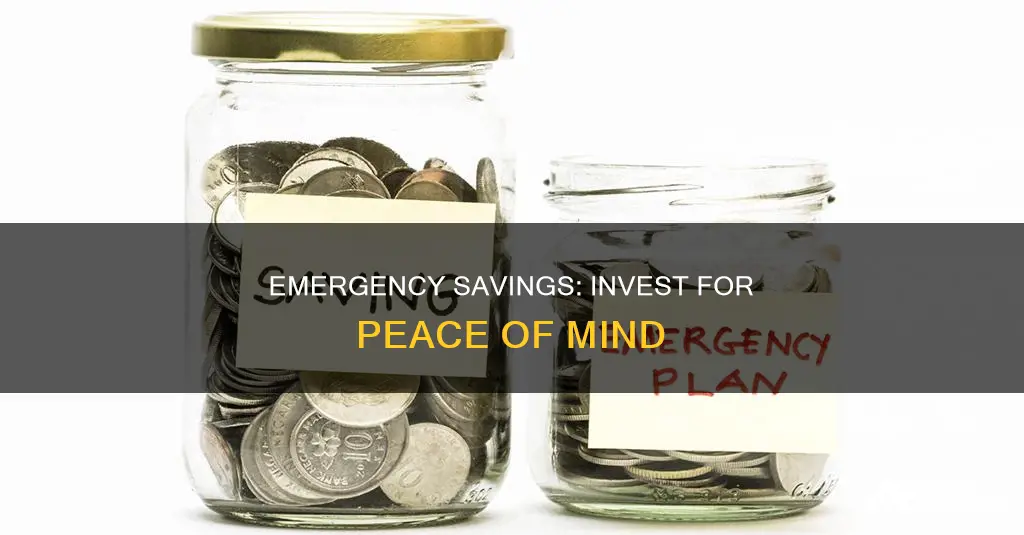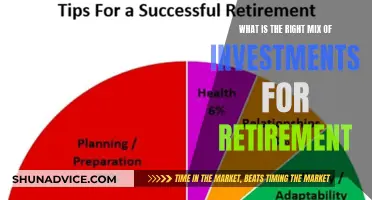
Emergency funds are a financial safety net, designed to cover unexpected costs like medical bills, home repairs, or travel expenses. While it's tempting to invest this money to grow your balance, it's generally not a good idea. Here's why.
Firstly, investing your emergency fund could mean losing money. If you put $5,000 into a brokerage account and invest in stocks or index funds, there's a chance that their value could drop, leaving you with less than you started with. In contrast, keeping your money in a savings account preserves your initial deposit.
Secondly, when you invest money into a taxable brokerage account, you'll pay taxes when you sell shares and realise your gains. The tax rate depends on how long you've held the shares, with short-term gains usually taxed at the same rate as your regular income.
Instead of investing your emergency fund, consider a high-yield savings account. While the interest rate may not be high, it's better than nothing, and you know your money won't fluctuate in value.
| Characteristics | Values |
|---|---|
| Recommended amount | 3-6 months' worth of expenses |
| Accessibility | Easily accessible |
| Liquidity | High liquidity |
| Risk | Low risk |
| Returns | Low returns |
| Volatility | Not volatile |

High-yield savings accounts
- Capital One 360 Performance Savings Account: This account has no fees or minimums and yields that beat the national average by a wide margin. The Capital One app is great for tech gurus and newbies alike, as it allows for seamless account management, credit monitoring, and savings automation.
- UFB Portfolio Savings: This account offers a competitive APY and has no maintenance or service fees and no minimum deposit. It also includes an ATM card and has no limits or restrictions on the number of transfers you can make each month.
- Bask Interest Savings Account: This account has a high APY and lacks hidden fees. It has no monthly fee, minimum deposit requirement, or balance requirement.
- Quontic Bank High Yield Savings: This account is offered by an online bank known for customer service and minimal fees. It has a high customer satisfaction score and offers more ways to get in touch with customer support than the average bank, including text and chat support.
- LendingClub High-Yield Savings: This account offers a variety of funding options, including cash deposits at participating MoneyPass ATMs, bank transfers, wire transfers, and more. It also stands out for offering live chat customer support and a free ATM card.
- Laurel Road High Yield Savings: This account is a competitive savings account with no fees or minimums, and the bank also offers equally enticing checking accounts, making it a solid digital option for those looking to bank in one place.
- Varo Savings Account: This account has no service fees and offers the potential for a high APY. It also includes tools to automate transfers and allows you to round up your debit card transactions to the nearest dollar and save your spare change automatically.
- TAB Bank High Yield Savings: This account is one of the best options for earning a high yield with no minimum deposit requirement. It has highly rated mobile apps and customer service, making it ideal for beginners looking for a hassle-free bank to grow with.
- EverBank Performance Savings: This account charges few fees overall, including no fee for incoming wire transfers (domestic and international). It has no deposit or balance requirements and has in-person branch locations.
- BrioDirect High-Yield Savings Account: This account pays a highly competitive rate on any balance over $25, making it well-suited for emergency funds and cash reserves for large purchases. It has no monthly fees, and interest compounds daily.
- Ivy Bank High-Yield Savings Account: This account offers one of the highest interest rates currently available, and its rate is locked through September 30, 2024. It also includes a Money Management platform that lets you sync and see your activity for all of your accounts, including budgeting, spend-tracking, debt payoff, and net worth features.
The Ethical Retirement Conundrum: Navigating a Moral Minefield
You may want to see also

Money market accounts
When choosing a money market account, it is important to look for accounts with high rates and no monthly fees. Some accounts may charge a monthly fee if a minimum daily balance is not maintained. It is also worth noting that money market accounts may have restrictions on the number of withdrawals per month, typically limiting it to six transactions.
Ask and You Shall Receive: The Power of Questions in Attracting Investments
You may want to see also

CDs
A certificate of deposit (CD) is a type of bank account that offers a higher interest rate than a standard savings account. CDs are insured by the Federal Deposit Insurance Corporation (FDIC) and are popular among those seeking safe, guaranteed returns.
When you open a CD, you must decide how long you're willing to commit your money for – typically anywhere from three months to five years. Each month, you'll earn interest on the money in your CD, and that interest will be added to your balance. Over time, the interest will compound, accelerating the speed at which your balance grows. Generally, CDs with longer maturities offer higher interest rates.
One drawback of keeping your emergency fund in a CD is that you usually must pay a penalty to cash out before it matures. The early withdrawal penalty on a five-year CD, for example, might be six months' worth of interest. If you cash out the CD before you've earned six months' worth of interest, the bank may take the penalty out of your principal.
To increase liquidity and avoid or minimise early withdrawal penalties, you can create a CD ladder. This involves buying several smaller CDs that mature at different intervals instead of one large CD. For instance, if you have a $12,000 emergency fund, you might put $3,000 into a six-month CD and $3,000 into a one-year CD, so that some of your cash won't be locked up for long.
While putting your emergency fund in a CD is safer than investing it, it's not as flexible as keeping your money in a standard savings account. However, if you can't bear to watch your emergency cash earn minimal interest in a savings account, a CD may be a reasonable choice.
Planning for Prosperity: Strategies for Retirement Investments
You may want to see also

Credit cards
Firstly, most reputable investment firms do not allow customers to invest using a credit card. This is because of the inherent risks involved. If you are unable to afford the amount you invest, you will rack up high interest on your balance, which will likely be more than any returns you make. The average credit card APR is above 19%, while average stock market returns are generally considered to be around 7-10%.
Secondly, if you lose money on your stock investment, you will face more debt owed in credit card fees, and your credit score will take a hit. You will also be charged a processing fee for each credit card transaction, which will impact your investment return.
Thirdly, if your card information gets into the wrong hands, you may be at risk of fraud. Investments made through a third-party wallet service or payment processor may mean limited recovery options.
Finally, if you are considering using a credit card to invest, you may be indicating a lack of financial stability. It is a good idea to wait until you have enough cash flow to support your investment.
There are some safer ways to use your credit card to help you get returns on the market. You can use an investment app such as Acorns or Stash, which allow you to link your credit card to a round-up program for each purchase you make. You can also open a credit card that invests rewards, such as the Fidelity® Rewards Visa Signature® Card, which offers a competitive 2% cash back on all purchases, deposited into a qualifying Fidelity account.
Bahamas: Foreign Investment Origins
You may want to see also

Brokerage accounts
Principal Isn't Protected
If you put money into a savings account, your balance can only stay the same or grow through interest payments. In a brokerage account, your principal amount is not protected. The value of your investments can decline, and you may end up with less money than you initially invested. This could leave you with insufficient funds to cover an emergency expense.
Volatility of Stocks
Investing in stocks through a brokerage account can potentially deliver high returns, but it also comes with a significant amount of risk. Stocks are volatile and can fluctuate in value. With an emergency fund, you need to ensure that the money is readily available when you need it. Investing in stocks may result in losses if you need to withdraw funds during a market downturn.
Potential Debt When Emergencies Arise
The purpose of an emergency fund is to avoid debt when unexpected expenses occur or if you face unemployment. However, if you keep your emergency savings in a brokerage account and your investments are down when you need the money, you may be reluctant to take a withdrawal and lock in a loss. If you can't access your emergency funds, you may have to take on debt to cover unexpected costs.
Tax Consequences
When you invest money into a taxable brokerage account, you will be responsible for paying taxes when you sell assets and realize gains. The tax rate depends on how long you held the assets before selling them. Short-term capital gains (assets held for a year or less) are taxed at your regular income tax rate, while long-term capital gains (assets held for over a year) are taxed at a lower rate of 0% to 20%. With emergency funds, you may need to sell assets quickly, potentially resulting in a higher tax burden.
While brokerage accounts offer the potential for higher returns, they also carry more risk. It is important to carefully consider your financial situation, risk tolerance, and investment goals before deciding to invest your emergency fund in a brokerage account.
Crypto Investments: Legal or Not?
You may want to see also
Frequently asked questions
It is recommended to have three to six months' worth of living expenses in your emergency fund. This amount will vary depending on your situation, but it's a good idea to aim for at least half a month's worth of expenses or $2,000, whichever is greater.
It's generally recommended to keep your emergency fund in a safe, low-risk, and highly liquid account, such as a savings account or money market fund. This ensures that you can access the money immediately when needed. However, some people choose to invest their emergency funds in the stock market or other investments to earn a higher return, but this comes with a higher risk of losing money.
When you invest your emergency fund, you run the risk of losing money if the value of your investments decreases. Additionally, you may owe taxes when you sell assets and withdraw from a taxable investment account. It's important to consider your risk tolerance and financial situation before deciding whether to invest your emergency fund.







